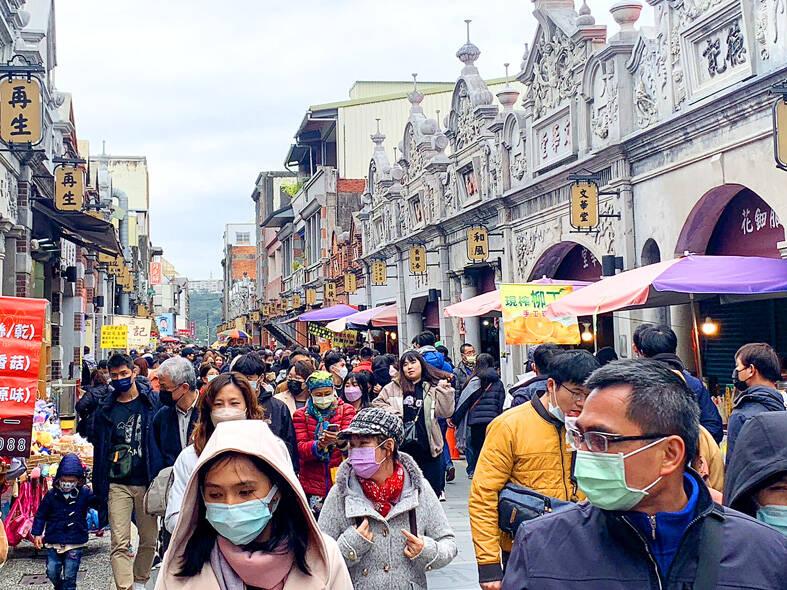The Legislative Yuan’s Internal Administration Committee today passed an initial review of amendments to memorial and public holiday regulations, but lawmakers failed to reach a consensus.
Despite the lack of consensus on which dates should be commemorated or designated public holidays, the draft’s key provisions were all retained for further deliberation.
The current Act on Implementing Memorial Days and State Holidays (紀念日及節日實施辦法) is enforced administratively, leading to several proposals that it be raised to the legal level by the the Taiwan People’s Party (TPP) caucus, Chinese Nationalist Party (KMT) Legislator Niu Hsu-ting (牛煦庭) and independent Legislator May Chin (高金素梅) said.

Photo: Lee Jung-ping, Taipei Times
Discussions within the committee saw most of the proposal’s articles retained, with the committee inviting Minister of the Interior Liu Shyh-fang (劉世芳) and other officials to attend talks.
Lawmakers from the opposition and ruling parties agreed to formulate regulations for the law’s implementation to highlight commemorative days’ significance, including mandating that celebrations be held or promoting historical lessons.
However, they did not agree on which days to commemorate.
On behalf of the KMT caucus, Niu proposed a day commemorating indigenous resistance, an Aug. 23 Memorial Day and other options, while Democratic Progressive Party (DPP) Legislator Huang Jie (黃捷) proposed a marriage equality day on May 24.
The KMT and TPP proposed a holiday for Labor’s Day and Teachers’ Day, in addition to days commemorating Taiwan’s recovery, lengthening the Lunar New Year public holiday to five days and a day celebrating immigrants, among others.
Chin proposed that indigenous groups choose their own three-day holiday.
As the committee did not agree to any one proposal regarding potential new public holidays, convener Niu said that the bill would move forward with further discussions on which days to commemorate.
The draft regulations were submitted to lawmakers for consideration and would be negotiated by the caucuses.

The Coast Guard Administration (CGA) yesterday said it had deployed patrol vessels to expel a China Coast Guard ship and a Chinese fishing boat near Pratas Island (Dongsha Island, 東沙群島) in the South China Sea. The China Coast Guard vessel was 28 nautical miles (52km) northeast of Pratas at 6:15am on Thursday, approaching the island’s restricted waters, which extend 24 nautical miles from its shoreline, the CGA’s Dongsha-Nansha Branch said in a statement. The Tainan, a 2,000-tonne cutter, was deployed by the CGA to shadow the Chinese ship, which left the area at 2:39pm on Friday, the statement said. At 6:31pm on Friday,

The Chinese People’s Liberation Army Navy’s (PLAN) third aircraft carrier, the Fujian, would pose a steep challenge to Taiwan’s ability to defend itself against a full-scale invasion, a defense expert said yesterday. Institute of National Defense and Security Research analyst Chieh Chung (揭仲) made the comment hours after the PLAN confirmed the carrier recently passed through the Taiwan Strait to conduct “scientific research tests and training missions” in the South China Sea. China has two carriers in operation — the Liaoning and the Shandong — with the Fujian undergoing sea trials. Although the PLAN needs time to train the Fujian’s air wing and

Taiwanese celebrities Hank Chen (陳漢典) and Lulu Huang (黃路梓茵) announced yesterday that they are planning to marry. Huang announced and posted photos of their engagement to her social media pages yesterday morning, joking that the pair were not just doing marketing for a new show, but “really getting married.” “We’ve decided to spend all of our future happy and hilarious moments together,” she wrote. The announcement, which was later confirmed by the talent agency they share, appeared to come as a surprise even to those around them, with veteran TV host Jacky Wu (吳宗憲) saying he was “totally taken aback” by the news. Huang,

The American Institute in Taiwan (AIT) put Taiwan in danger, Ma Ying-jeou Foundation director Hsiao Hsu-tsen (蕭旭岑) said yesterday, hours after the de facto US embassy said that Beijing had misinterpreted World War II-era documents to isolate Taiwan. The AIT’s comments harmed the Republic of China’s (ROC) national interests and contradicted a part of the “six assurances” stipulating that the US would not change its official position on Taiwan’s sovereignty, Hsiao said. The “six assurances,” which were given by then-US president Ronald Reagan to Taiwan in 1982, say that Washington would not set a date for ending arm sales to Taiwan, consult